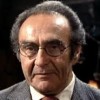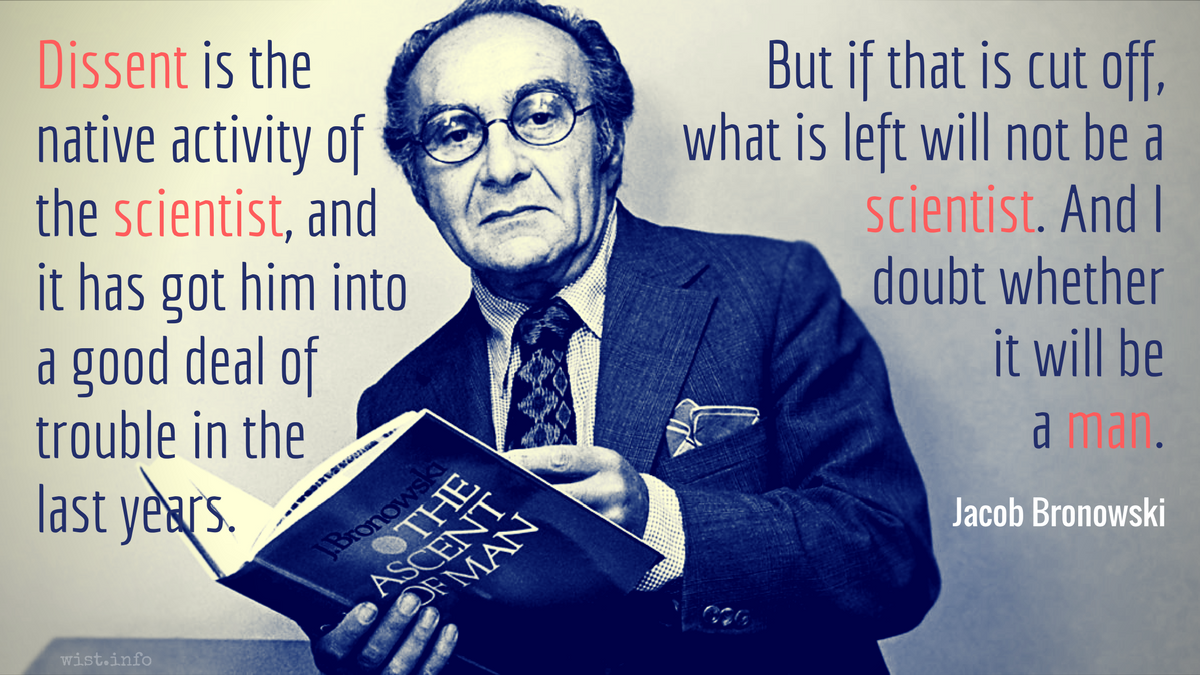There is no correct description of nature. Nature is more subtle, more deeply intertwined and more strangely integrated than any of our pictures of her — than any of our errors. It is not merely that our pictures are not full enough; each of our pictures in the end turns out to be so basically mistaken that the marvel is that it worked at all.
Jacob Bronowski (1908-1974) Polish-English humanist and mathematician
“The Abacus and the Rose” [Potts], Science and Human Values (1965 ed.)
(Source)
Quotations by:
Bronowski, Jacob
I, having built a house, reject
The feud of eye and intellect,
And find in my experience proof
One pleasure runs from root to roof,
One thrust along a streamline arches
The sudden star, the budding larches.The force that makes the winter grow
Its feathered hexagons of snow,
and drives the bee to match at home
Their calculated honeycomb,
Is abacus and rose combined.
An icy sweetness fills my mind,A sense that under thing and wing
Lies, taut yet living, coiled, the spring.Jacob Bronowski (1908-1974) Polish-English humanist and mathematician
“The Abacus and the Rose” [Potts], Science and Human Values (1965 ed.)
(Source)
Christopher Columbus discovered the West Indies, and Alexander Graham Bell invented the telephone. We do not call their achievements creations because they are not personal enough. The West Indies were there all the time; and as for the telephone, we feel that Bell’s ingenious thought was somehow not fundamental. The groundwork was there, and if not Bell then someone else would have stumbled on the telephone almost as accidentally as on the West Indies.
By contrast, we feel that Othello is genuinely a creation. This is not because Othello came out of a clear sky; it did not. There were Elizabethan dramatists before William Shakespeare, and without them he could not have written as he did. Yet within their tradition Othello remains profoundly personal; and though every element in the play has been a theme of other poets, we know that the amalgam of these elements is Shakespeare’s; we feel the presence of his single mind. The Elizabethan drama would have gone on without Shakespeare, but no one else would have written Othello.
In effect what Luther said in 1517 was that we may appeal to a demonstrable work of God, the Bible, to override any established authority. The Scientific Revolution begins when Nicolaus Copernicus implied the bolder proposition that there is another work of God to which we may appeal even beyond this: the great work of nature. No absolute statement is allowed to be out of reach of the test, that its consequence must conform to the facts of nature.
No fact in the world is instant, infinitesimal and ultimate, a single mark. There are, I hold, no atomic facts. In the language of science, every fact is a field — a crisscross of implications, those that lead to it and those that lead from it. We condense the laws around concepts. Science takes its coherence, its intellectual and imaginative strength together, from the concepts at which its laws cross, like knots in a mesh.
The human baby, the human being, is a mosaic of animal and angel.
Jacob Bronowski (1908-1974) Polish-English humanist and mathematician
The Ascent of Man, ch. 1 (1973)
(Source)
The world can only be grasped by action, not by contemplation. The hand is more important than the eye. We are active; and indeed we know, as something more than a symbolic accident in the evolution of man, that it is the hand that drives the subsequent evolution of the brain. We find tools today made by man before he became man. Benjamin Franklin in 1778 called man “a tool-making animal,” and that is right.
It’s said that science will dehumanize people and turn them into numbers. That’s false, tragically false. Look for yourself. This is the concentration camp and crematorium at Auschwitz. This is where people were turned into numbers. Into this pond were flushed the ashes of some four million people. And that was not done by gas. It was done by arrogance, it was done by dogma, it was done by ignorance. When people believe that they have absolute knowledge, with no test in reality, this is how they behave. This is what men do when they aspire to the knowledge of gods.
What we really mean by free will, of course, is the visualizing of alternatives and making a choice between them. In my view, which not everyone shares, the central problem of human consciousness depends on this ability to imagine.
Jacob Bronowski (1908-1974) Polish-English humanist and mathematician
The Origins of Knowledge and Imagination, ch. 1 “The Mind as an Instrument for Understanding” (1978)
(Source)
Dissent is the native activity of the scientist, and it has got him into a good deal of trouble in the last years. But if that is cut off, what is left will not be a scientist. And I doubt whether it will be a man.
Jacob Bronowski (1908-1974) Polish-English humanist and mathematician
Lecture, MIT (19 Mar 1953)
(Source)
Reprinted as Science and Human Values, Part 3, sec. 5 "The Sense of Human Dignity" (1961).
Man masters nature not by force but by understanding. This is why science has succeeded where magic failed: because it has looked for no spell to cast over nature.


